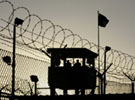Former military prosecutor notes ‘staggering cost’ of money & time needed to house Guantanamo detainees
Law Prof. Chris Jenks visits Guantanamo and blogs about the facility's 'staggering cost.'

DALLAS (SMU) — SMU Dedman School of Law Prof. Chris Jenks, director of the Criminal Justice Clinic, just returned from a nine-day visit to Naval Base Guantanamo, where the five men accused of planning the 9/11 attacks are imprisoned with others believed to have terrorist ties.
Prof. Chris Jenks interviewed by WFAA News. |
Lt. Col. Jenks (U.S. Army, Ret.) visited on behalf of the National Institute of Military Justice. While there, he observed military commission proceedings and blogged about his experiences.
Prof. Jenks worked at the Pentagon as a Judge Advocate, serving as chief of the U.S. Army’s international law branch. As a military prosecutor he was lead counsel on the Army’s first counter-terrorism case, a fully contested classified court-martial of a National Guard soldier who attempted to aid the al-Qaida terrorist network.
With interest in terrorist activities at a high right now, Prof. Jenks notes:
- “People are massively misjudging the time horizon for Gitmo. Most people don’t realize the commissions really haven’t even started, and how much more is to come. This is a not a next-five-years problem, it’s a next-40-years problem, and at a staggering cost. Currently it costs $2.7 million per detainee per year to house them at Gitmo, while it costs $78,000 per person, per year, to incarcerate someone in a maximum-security facility here in the U.S.”
- “The alleged 9/11 planners have more and better defense resources at a military commission than a U.S. Service member would have facing court-martial. In this respect, the 9/11 accused and their counsel are in sole position of the moral high ground. The defense counsel is doing a far better job of advocating for due process, rights and American values while representing individuals alleged to have killed nearly 3,000 people.”
- “Even if the 9/11 accused are found guilty and sentenced to death, the appellate process will add more than a decade to the process. In addition, since some of the detainees are in the mid-30s, they could well live into their 70s or 80s. That’s why the Department of Defense, citing the expected increased medical needs of an aging detainee population, is requesting $11 million for a detainee health clinic at Gitmo. I’m not sure the American people have thought about continued indefinite detention of geriatric members of al-Qaida.”
- “Our country needs to recognize this issue and embrace 1) release or transfer of the detainees 2) continue their detention at Gitmo at an exorbitant cost or 3) transfer the detainees to a facility in the U.S.”
- “A key factor in all this is the manner in which the U.S. treated some of the detainees — a manner that went well beyond the inherent coercion of battlefield capture and questioning. As President Obama recently acknowledged, ‘We tortured some folks.’ And if the actions didn’t constitute torture, they may have included cruel, inhumane or degrading treatment, which violates the Geneva Conventions.”
- “I didn’t talk with the victims’ families. I don’t know what their expectations or goals were in traveling there. But if it was to achieve some kind of closure, they have to have left bewildered and disappointed,” Jenks says of the frustratingly slow process. But in some ways, that’s to be expected. “This is in the largest case in U.S. criminal history, with 2,779 victims and hundreds of thousands of documents, witnesses and evidence across a number of continents.”
- Will the process pick up momentum? “If history is any indication, the answer is, unfortunately, no. Like Sisyphus, doomed to perpetually push the same boulder up the same hill every day, there’s a kind of ‘road to perdition’ aspect to all this.”
# # #
#21103-nr-08/29/2014-dg